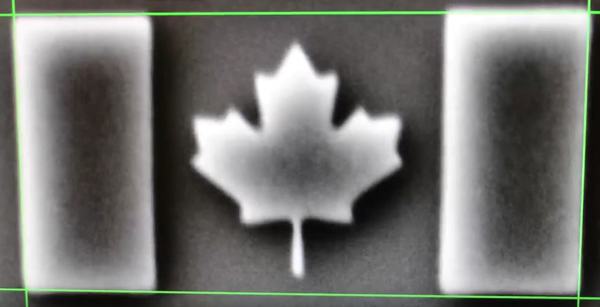The University of Waterloo has been recognized by Guinness World Records.
The university’s Institute for Quantum Computing has created the world’s smallest national flag.
GUINNESS WORLD RECORDS™ granted the inaugural award for smallest national flag to the Institute for Quantum Computing (IQC) at Waterloo for the flag measuring 1.178 micrometres in length. It is invisible without the aid of an electron microscope.
Nathan Nelson-Fitzpatrick, nanofabrication process engineer at IQC, led the creation of the flag with assistance from Natalie Prislinger Pinchin, a Waterloo co-op student from the Faculty of Engineering. They created it on a silicon wafer bearing the official logo of the Canada 150 celebrations using an electron beam lithography system in the Quantum NanoFab facility at Waterloo.
“Canada 150 celebrates our past, present and future,” said Tobi Day-Hamilton, associate director of communications and strategic initiatives at IQC. “The future of Canadian technology is firmly set in the quantum world and at the nano-scale, so what better way to celebrate the lead up to 2017 than with a record-setting, nano-scale national flag.”
The record-setting flag was unveiled at IQC’s open house on September 17, which attracted nearly 1,000 visitors. It will also be on display in QUANTUM: The Exhibition, a Canada 150 Fund Signature Initiative, and part of Innovation150, a consortium of five leading Canadian science-outreach organizations. QUANTUM: The Exhibition is a 4,000-square-foot, interactive, travelling exhibit IQC developed highlighting Canada’s leadership in quantum information science and technology.
“I’m delighted that IQC is celebrating Canadian innovation through QUANTUM: The Exhibition and Innovation150,” said Raymond Laflamme, executive director of IQC. “It’s an opportunity to share the transformative technologies resulting from Canadian research and bring quantum computing to fellow Canadians from coast to coast to coast.”
The first of its kind, the exhibition will open at THEMUSEUM in downtown Kitchener on October 14, and then travel to science centres across the country throughout 2017.
Agencies/Canadajournal
 Canada Journal – News of the World Articles and videos to bring you the biggest Canadian news stories from across the country every day
Canada Journal – News of the World Articles and videos to bring you the biggest Canadian news stories from across the country every day



